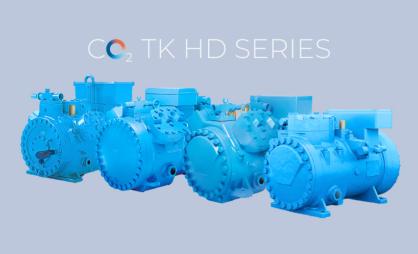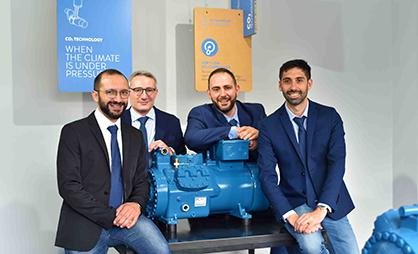Hydrocarbon refrigerants: Propane and isobutane in the spotlight
Frascold clears things up

Performance characteristics and relevant advantages of the two most used HCs
Natural refrigerants, such as propane and isobutane, are gaining more and more popularity, due to their low environmental impact and exceptional thermodynamic properties, which promise to make the refrigeration and heating industries increasingly sustainable and ready to meet future demands.
Hydrocarbon Refrigerants include propane, isobutane and isopentane. The latter is used in heat pumps that reach very high temperatures that is up to 160°C, although it is still the subject of studies for its full application. In addition, some the most used hydrocarbons also include R1270 (propylene), remarkable for its effectiveness in low temperature contexts for excellent performance up to -45°C and R170 (ethane), ideal for systems operating at very low temperatures, that is up to -90°C.
Hydrocarbons Identikit: advantages and potential applications
Propane
Propane is renowned for its guarantee of high performance, with operating pressures similar to HFC or HFO refrigerants and a significantly lower environmental impact. Its wide availability on the market facilitates its adoption in multiple sectors such as refrigerated transport, process refrigeration, air conditioning and heating, as in the case of heat pumps, confirming that it is a valid choice in terms of efficiency and sustainability.
Isobutane
R600a refrigerant gas, commonly known as isobutane, is renowned for its good thermodynamic properties that make it particularly efficient in numerous refrigeration cycles. A valid alternative to high GWP refrigerants, this gas is often used in high temperature heat pumps (up to 80-85°C) of the water-water type. In addition, besides being non-toxic, it is a safe gas, with low global warming potential as it lacks ozone depletion potential.

A journey to discover the differences between R290 and R600
The main differences between propane and isobutane affect their performance in different applications. Propane is beneficial for its ability to reach atmospheric pressure at much lower evaporation temperatures compared to isobutane, evaporating at about -42°C. Conversely, isobutane requires higher evaporation temperatures, that is around -10°C. Propane is particularly suitable for applications that require low temperature operations, such as air-water heat pumps, used during the winter. In detail, given that the evaporation temperature of these heating systems is influenced by the environment, propane is an optimal choice to maintain high performance, even in cold weather conditions. Isobutane on the other hand has a lower density compared to propane and can condense at higher temperatures. This trait makes the refrigerant suitable for high temperature heat pumps or for a second stage of a cascade system. Under these conditions, isobutane can be used to heat fluids up to 80-85°C efficiently and effectively.
Regulations for the use of hydrocarbons
The European standard EN 378 and the ATEX Directive regulate the use of R290 and R600. The former addresses safety and environmental requirements of the entire life cycle of refrigeration systems or from their design to disposal. A point of reference for refrigeration technicians at any level in the plant construction and management chain. The latter, the ATEX 1999/92/EC standard, acronym of "ATmosphere EXplosible", was designed to establish the minimum requirements to protect the occupational health and safety of users, where there is a potentially explosive atmosphere due to flammable mixtures of gases, vapors, mists or combustible dust in the air.
To meet this need, Frascold offers ATEX certified solutions, in the 3G category, with piston compression technology with our ATEX HT and ATEX HC series, and with screw technology with our ATEX FVR and CX ATEX series. The increasing use of natural refrigerants such as propane and isobutane reveals a significant step forward in the field of refrigeration and heating, offering solutions that combine efficiency and sustainability compared to HCF or HCFC refrigerants. However, the need to address safety challenges underlines the importance of investing in the research and development of increasingly safe and innovative technologies and in the training of installers. To us - at Frascold - addressing future challenges for a better world for future generations translates into a constant commitment to the development of increasingly advanced and natural solutions.





